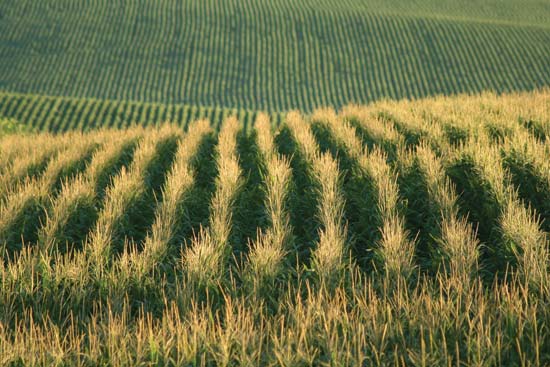
 Georgetown makes an excellent effort to be a green campus. Recycling bins are everywhere, students proudly bear reusable water bottles, and the buses run on biofuel. It is great that Georgetown is making an effort to use renewable energy, but biofuel is not the miracle substitute for oil it promises to be.
Georgetown makes an excellent effort to be a green campus. Recycling bins are everywhere, students proudly bear reusable water bottles, and the buses run on biofuel. It is great that Georgetown is making an effort to use renewable energy, but biofuel is not the miracle substitute for oil it promises to be.
The majority of biofuels are produced form a corn crop. The corn is milled and then mixed with heated water and enzymes so it may be fermented into ethanol. The ethanol is then distilled into a product that can fuel diesel engines. When burned, biofuels release significantly less carbon dioxide into the atmosphere because they only emit the carbon dioxide that plants absorbed during photosynthesis.
This information makes biofuels sound great, but the positive impact they can have on the environment is hugely exaggerated. Original research that claimed biofuels would significantly cut carbon emissions from cars was so promising because it gave fuel crops full credit for soaking up carbon while growing. This failed to account for the fact that biofuel-producing plants likely displaced native vegetation capable of consume more carbon dioxide from the air. In an article in Foreign Policy magazine, Michael Grunwold remarks, “It was if they assumed that biofuels would only be grown in parking lots.”
The growing demand for biofuels has proven this a damaging mistake. Economics has encouraged farms to clear more land to produce more food for biofuels. This alone offsets any advantages biofuels may have over fossil fuels because it is known that deforestation accounts for 20 percent of extraneous carbon dioxide emissions. This means we must work to clear less land for agriculture, not more like biofuels require.
A lot of corn needs to be milled to produce biofuels. The amount ofgrain it takes to fill an SUV tank with biofuel could feed a hungry person for a year. Biofuel crops are reducing the amount corn allocated to food use, placing constant upward pressure on global food prices. Even if food could be produced in another setting and every grain crop in America was used for ethanol production biofuels would only replace one fifth of U.S. gas consumption.
Another adverse affect to increasing agriculture production for biofuels is that it wastes fresh water. Over 70 percent of all freshwater used by humans is used in agricultural processes. Farmers around the globe are struggling to provide their crops with enough fresh water as demand for food grows with population size. Many mine groundwater from nonrenewable aquifers for crop irrigation. It is indisputable that we should make every effort to conserve freshwater, as it is essential to all living organism survival. Therefore, it is not prudent to waste 3,000 liters of water to produce one liter of biofuel.
The invention and use of biofuels was a step in the right direction for clean energy. It is imperative we move away from the use of fossil fuels, as they are both unsustainable and harmful to the environment. However, we need to keep challenging the effectiveness of our renewable energy sources.
At Georgetown we are taught to challenge established institutions, so improvements might continue to take place. Biofuel buses were a positive step forward, but there is no doubt we can do better.
 Lauren Gros is a freshman in the School of Foreign Service. The Modern Lens appears every other Thursday at thehoya.com
Lauren Gros is a freshman in the School of Foreign Service. The Modern Lens appears every other Thursday at thehoya.com















